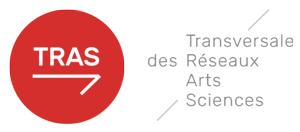Who we are
TRAS – Transversal of Arts Sciences Networks [Transversale des Réseaux Arts Sciences], is an independent non-profit organisation since 2017. It is composed of about twenty artistic, cultural, academic and research organisations engaged in the development of relations between arts, sciences and technologies. Together they create favorable conditions for the encounter between artists and scientists or technologists, at a national and European level in order to allow the emergence of new projects, sharing of ideas, production and circulation of artistic works.
Between research in art, and new technologies applied to performing arts, TRAS proposes to highlight a third approach based on joint research between artists and scientists. This “in-between” and the linked processes are approached from the point of view of artists and scientists through their potential reciprocities. Outcomes can be found both in the logic of social or technological innovation and in education when conceiving artistic and cultural education dispositives.
Our charter
In 2015, members of TRAS decided to draw up a charter that serves as a guiding document.
All signatories and supporters of the founding charter of the Transversale des Réseaux Arts Sciences unite their forces to promote their activities, which focus on developing arts sciences projects. The organisation is open to all operators or structures which share this approach and dedicate a part or all their activities, in a formal or informal way, to promoting the relation between arts and sciences.
The charter was translated in German (page 46), English (page 50), Spanish (page 54) and Italian (page 58).
Download our charter
Our objectives
o Create an exchange network – share information, best practices and know-how,
o Improve the visibility of arts sciences actions and their better understanding in public policies,
o Promote the international mobility of cultural arts and sciences professionals and their ecosystems (higher education, research laboratories, companies),
o Promote the mobility of identified artists and / or the dissemination of the projects stamped by TRAS,
o Propose a different approach and develop new modes of transnational cooperation,
o Transform our own models and processes and get inspired by others.
Working groups
The reflections and actions of TRAS’s members are structured around four thematic working groups:
> Œuvres-Création-Production-Diffusion (Works/Creation/Production/Dissemination)
This group allows a dynamic of regular exchanges of information on artistic projects arts sciences, embryonic, being edited, or ready to be disseminated.
> Éducation artistique scientifique et terrestre (Science and Earth Arts Education)
This group is working on the co-writing of a guide of good practices laying down the principles of an educational approach in the field of the relationship arts sciences, towards the different audiences.
Particular attention is paid to living, human and non-human and to raising awareness of contemporary, environmental and societal issues.
> Ressources & territoires (Resources & Territories)
The roadmap of this group is structured around three axes:
♦ supervise the national survey of actors and actions in the field of arts sciences;
♦ identify recommendations for the recognition of the arts sciences field, the accompaniment of the field and its actors and the emergence of “territories” arts sciences;
♦ reflect on an interoperable resource platform, a tool for research, for linking actors, for disseminating and promoting arts sciences projects.
> Europe – International
Since its creation, TRAS has had the will to reconcile approaches of structuring on a national and European scale.
This working group aims to:
♦ develop our practices by opening up to those of actors from other countries;
♦ Create a network of exchanges and rapprochement on arts and science issues at European level through:
– the creation of a mapping of arts and technology initiatives in Europe ;
– the implementation of European mobility for TRAS members, within the framework of the Erasmus+ accreditation

